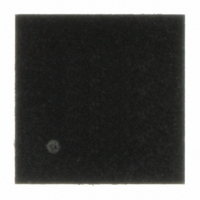L5983TR STMicroelectronics, L5983TR Datasheet - Page 12

L5983TR
Manufacturer Part Number
L5983TR
Description
IC REG SW 1.5A STEPDOWN 8-VFQFPN
Manufacturer
STMicroelectronics
Type
Step-Down (Buck)r
Specifications of L5983TR
Internal Switch(s)
Yes
Synchronous Rectifier
No
Number Of Outputs
1
Voltage - Output
0.6 ~ 18 V
Current - Output
1.5A
Frequency - Switching
250kHz ~ 1MHz
Voltage - Input
2.9 ~ 18 V
Operating Temperature
-40°C ~ 125°C
Mounting Type
Surface Mount
Package / Case
8-VFQFN, 8-VFQFPN
Power - Output
1.5W
For Use With
497-6386 - BOARD EVAL FOR L5983
Lead Free Status / RoHS Status
Lead free / RoHS Compliant
Other names
497-6860-2
L5983TR
L5983TR
Available stocks
Company
Part Number
Manufacturer
Quantity
Price
Functional description
4.4
12/37
Overcurrent protection
The L5983 implements the over current protection sensing current flowing through the
power MOSFET. Due to the noise created by the switching activity of the power MOSFET,
the current sensing is disabled during the initial phase of the conduction time. This avoids an
erroneous detection of a fault condition. This interval is generally known as “masking time”
or “blanking time”. The masking time is about 200 ns.
When the over current is detected, two different behaviors are possible depending on the
operating condition.
1.
2.
So the over current protection can be summarized as an “hiccup” intervention when the
output is in regulation and a constant current during the soft-start phase.
If the output is shorted to ground when the output voltage is on regulation, the over current is
triggered and the device starts cycling with a period of 2048 clock cycles between “hiccup”
(power MOSFET off and no current to the load) and “constant current” with very short on-
time and with reduced switching frequency (up to one eighth of normal switching frequency).
See
Figure 32
Output voltage in regulation. When the over current is sensed, the power MOSFET is
switched off and the internal reference (V
error amplifier, is set to zero and kept in this condition for a soft-start time (T
clock cycles). After this time, a new soft-start phase takes place and the internal
reference begins ramping (see
Soft-start phase. If the over current limit is reached the power MOSFET is turned off
implementing the pulse by pulse over current protection. During the soft-start phase,
under over current condition, the device can skip pulses in order to keep the output
current constant and equal to the current limit. If at the end of the “masking time” the
current is higher than the over current threshold, the power MOSFET is turned off and it
will skip one pulse. If, at the next switching on at the end of the “masking time” the
current is still higher than the threshold, the device will skip two pulses. This
mechanism is repeated and the device can skip up to seven pulses. While, if at the end
of the “masking time” the current is lower than the over current threshold, the number of
skipped cycles is decreased of one unit. At the end of soft-start phase the output
voltage is in regulation and if the over current persists the behavior explained above
takes place. (see
for short circuit behavior.
Figure
8.b)
Doc ID 13005 Rev 6
Figure
8.a).
REF
), that biases the non-inverting input of the
SS
, 2048
L5983














